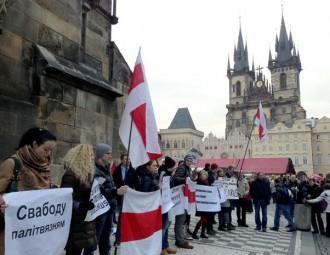Opposite views of the Belarusan opposition

On July 15 Aliaksandr Milinkevich and Andrei Sannikau, Belarusan opposition leaders, participated in a round-table on Belarus in Warsaw, writes Ryhor Astapenia.
Although they both belong to the Belarusan opposition, their views on how to improve the situation in Belarus differ a lot.
Leader of the European Belarus Andrei Sannikau and leader of the Movement for Freedom Aliaksandr Milinkevich advocate different approaches when it comes to sanctions, participation in the elections and dialogue with the authorities. Milinkevich often says that if there is no dialogue between the regime grassroots the EU, Belarus will lose its independence. Sannikau strongly argues in favour the imposition of sanctions and accuses the EU of being too soft.
The first camp ("revolutionists") believes that the international pressure on the government can change the regime. Therefore, the West should necessarily impose sanctions on Belarus and limit all contacts with the officials. According to the second camp ("evolutionists"), changes in Belarus will come from the bottom upwards more evolutionary and focus on the grassroots work with the society. Instead of the sanctions this camp believes in Belarus’ engagement Europe, including its officials on various levels.
|
Sanctions |
Participation in the elections |
Dialogue with the authorities |
|
|
Revolutionists |
Sanctions put pressure and punish the Belarusan leadership |
Participation in elections remains a complicity in crime |
The EU should limit contacts with the authorities not to legitimise them |
|
Evolutionists |
Sanctions hurt common people and push Belarus towards Russia |
The opposition should participate in elections to reach the wider audience of Belarusans |
The EU should talk to the regime after release of political prisoners |
Sanctions, boycott, no dialogue
The "revolutionists" camp supports imposition of sanctions against Belarusan companies and individuals. Charter97 web site remains the main media instrument of this camp.
This camp believes that the sanctions put pressure on the regime in Minsk and the only language which the regime understands well. Termination of oil products and potash fertilisers trade with Belarus, freezing of bank accounts and termination of communication will create pressure to release political prisoners and the eventual fall of the regime.
This camp believes that in today's Belarus, there is no need to participate in elections, and the opposition taking part in them becomes partners in crime. In 2012 this opposition camp boycotted the parliamentary elections. Also, this group boycotted the previous parliamentary elections in 2008, but took part in the presidential campaign in 2010.
The revolutionists see no sense in holding a dialogue with the regime of Lukashenka. In their view, the dialogue only strengthens and legitimises the regime in Minsk and is immoral.
Engagement of Belarus and grassroots work
The evolutionists argue against economic sanctions towards Belarus. For Freedom movement of Milinkevich, Tell the Truth campaign and the Party of the Belarusan Popular Front belong to the "evolutionists" camp. These organisations also support the recent “People`s Referendum”.
According to this camp, economic sanctions can be imposed only if the Belarusan opposition gains broad support in the society. Otherwise, the sanctions would only increase the political and economic grip of Russia without strengthening the opposition.
This camp believes that economic sanctions could not bring benefits for Belarus, and the dialogue remains more efficient. The EU economic sanctions against Belarus will lead to the isolation of the country: the authorities will not release political prisoners and fear in society will increase, while support of the opposition and pro-European moods will decline.
The "evolutionists" support the opposition's participation in the elections. In their opinion, in today's Belarus opposition should use all available legal means to communicate with people. If the opposition fails to participate, then it will simply become invisible to most Belarusans.
Aliaksandr Milinkevich was the single candidate of the opposition in 2006, refused to participate in the 2010 election because of the lack of strategy within the opposition. However, he took part in the parliamentary election of 2012, but the authorities did not register him as a candidate.
How to find a common ground
While these ways of thinking remain dominant in the Belarusan opposition today, some politicians may have a position that coincides with the opinion of one camp at one point, and with the opinion of the other camp at the other. For example, a political prisoner and former presidential candidate Mikalai Statkevich opposes any dialogue with the regime, but at the same time considers that the opposition should take part in the elections.
Both opposition camps agree that EU should simplify the visa regime, introduce scholarships and release of political prisoners. However, their tactics on certain issues remain mutually exclusive.
It is normal that political forces disagree on certain things. But if the opposition cannot work out a common strategy, it should at least reach a mutual understanding to avoid public attacks against each other. Self-destruction of the opposition is a part of the plan of Belarusan authorities. If the opposition reaches this agreement, it would break the authorities’ pattern.
Instead of focusing on how to appear more intelligent and principled by criticising other opponents of Lukashenka, the opposition should think how to get wider support from the Belarusan society and achieve practical goals. The West should also contribute to improving the culture of respect of views of others within the opposition. This can become a long-lasting contribution to democracy building in Belarus.
-
03.01
-
07.10
-
22.09
-
17.08
-
12.08
-
30.09








































